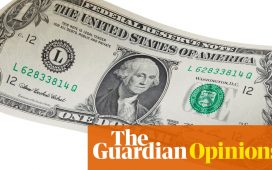Receive free Electric vehicles updates
We’ll send you a myFT Daily Digest email rounding up the latest Electric vehicles news every morning.
A US loan office plans to lend a record $9.2bn for electric vehicle battery factories being constructed by carmaker Ford and South Korea’s SK On, as Washington pushes to develop domestic supply chains and reduce industrial reliance on China.
The conditional loan from the US Department of Energy is part of a clean energy investment push by the government that was supercharged by last year’s passage of the Inflation Reduction Act.
Ford and battery maker SK On are building three new factories, two in Kentucky and one in neighbouring Tennessee, to supply the carmaker’s growing line-up of EVs.
The $9.2bn loan is the single largest investment in the two-decade history of the Loan Programs Office, a formerly obscure division of the energy department’s office that was given extra lending authorities under the IRA.
“This effort supports President [Joe] Biden’s Investing in America agenda to onshore and reshore domestic manufacturing of technologies that are critical to reaching the clean energy and transportation future,” said Jigar Shah, the head of the LPO, on Thursday.
The three battery plants combined will enable more than 120 gigawatt hours of US battery production annually, according to the DoE. The energy from the batteries will displace more than 455mn gallons of petrol a year, according to the DoE — roughly 0.3 per cent of US gasoline demand.
Ford and SK announced in 2021 they would invest $11bn to construct an electric vehicle assembly plant, battery factory and supplier in Tennessee, along with the two battery plants in Kentucky.
The factories are part of the emerging so-called battery belt in the South of the US, which has also received a boost from $369bn in tax credits made available under the IRA.
In February, Ford announced it would make batteries that contain technology from China’s CATL in a new $3.5bn factory in Michigan, a move that caused political backlash from some Republican politicians.
But the company last month said it would scale back future investments in its China-based business, where its marketed share has declined since 2016.
The LPO issued $31.6bn in loans in fiscal year 2022, with estimated losses of about $1bn, well below the $5bn set aside for losses and a rate on par with commercial institutions.
Earlier this year, the LPO offered a conditional loan of $2bn to Redwood Materials for a battery materials plant; offered a $3bn partial loan guarantee to Sunnova Energy for a solar and battery storage project; and announced a $850mn commitment to the battery maker Kore Power to build a plant in Arizona.







